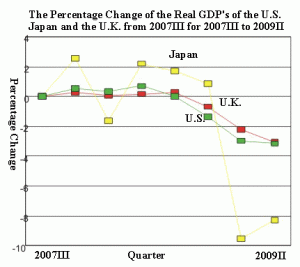Presumably, then, to many of those who’ve commented on yesterday’s post and to NEF and others, today’s confirmation of UK 2010 Q4 economic contraction is good news (the graph is from ONS data).
Presumably, then, to many of those who’ve commented on yesterday’s post and to NEF and others, today’s confirmation of UK 2010 Q4 economic contraction is good news (the graph is from ONS data).
Filed under Uncategorized
 I responded to a piece by Viki Johnson of New Economic Foundation on the China Dialogue website. This is a re-post of my response, which you can also read here:
I responded to a piece by Viki Johnson of New Economic Foundation on the China Dialogue website. This is a re-post of my response, which you can also read here:
Yesterday, as part of chinadialogue’s series on well-being economics, Viki Johnson of the new economics foundation argued that endless economic growth is neither possible nor necessary. Here Andrew Pendleton, associate director of the Institute for Public Policy Research (ippr), responds.
Filed under Uncategorized
 Grist posted the results of a US poll earlier this week showing the popularity of alternative forms of energy. Remarkably, its article is without substance or much commentary, which is why I’m merely pasting in the poll results here.
Grist posted the results of a US poll earlier this week showing the popularity of alternative forms of energy. Remarkably, its article is without substance or much commentary, which is why I’m merely pasting in the poll results here.
Three points of interest: First, a Senate bill focused on clean energy (ill defined in the question, but nevertheless pretty clear) is very popular. Second, a drilling bill is also fairly popular. Third, no mention of climate change. Continue reading
Filed under Uncategorized
 Our good friends over at The Breakthrough Institute have a new report out on the rebound effect – the idea that as energy efficiency increases, we use part of the savings we make to consume more energy, and overall the impacts of energy efficiency are much less than we think. This comes on the heels of Steve Sorrell’s excellent review of the subject in 2009.
Our good friends over at The Breakthrough Institute have a new report out on the rebound effect – the idea that as energy efficiency increases, we use part of the savings we make to consume more energy, and overall the impacts of energy efficiency are much less than we think. This comes on the heels of Steve Sorrell’s excellent review of the subject in 2009.
There is plenty of evidence that the rebound effect is real. But it would be a mistake to jump to the conclusion that this means it is impossible to reduce energy intensity Continue reading
Filed under Uncategorized
 Mckinsey have just produced a report for the European Gas Advocacy Forum saying that Europe could hit its 2050 emissions target (an 80% cut on 1990 levels) for almost €1 trillion less if it built more gas rather than wind. Leaving aside the fact that Mckinsey also recently worked on the ECF’s Roadmap 2050 project on how the EU could meet its targets without gas at reasonable cost, they are not alone in making the cost argument for gas. Continue reading
Mckinsey have just produced a report for the European Gas Advocacy Forum saying that Europe could hit its 2050 emissions target (an 80% cut on 1990 levels) for almost €1 trillion less if it built more gas rather than wind. Leaving aside the fact that Mckinsey also recently worked on the ECF’s Roadmap 2050 project on how the EU could meet its targets without gas at reasonable cost, they are not alone in making the cost argument for gas. Continue reading
Filed under Uncategorized